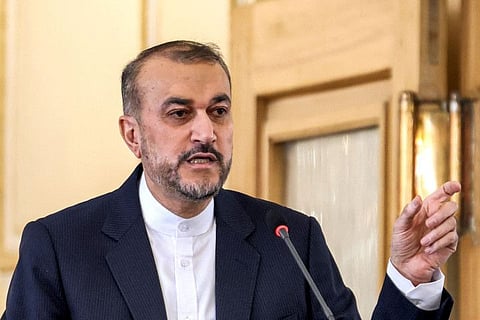Hossein Amir-Abdollahian, Iran’s anti-Western top diplomat
His tenure marked by intensified diplomatic activity to end Iran’s isolation

TEHRAN: Iranian foreign minister Hossein Amir-Abdollahian, who has died in a helicopter crash along with president Ebrahim Raisi, was known for his fierce anti-Israel sentiment and scepticism of the West.
A career diplomat and conservative figure with close ties to the Revolutionary Guards, Amir-Abdollahian took office following Raisi’s 2021 election win.
State media at the time hailed his support for “the resistance axis”, Tehran-aligned armed groups across the Middle East arrayed against arch-foe Israel.
Amir-Abdollahian’s tenure as Iran’s top diplomat was marked by intensified diplomatic activity to end Iran’s isolation and offset the impact of crippling US sanctions.
He particularly sought to forge between relations with the Islamic republic’s Arab neighbours including Saudi Arabia.
In a landmark Chinese-brokered deal, Tehran and Riyadh agreed in March 2023 to restore ties and reopen their respective embassies.
Amir-Abdollahian was born in the city of Damghan, east of Tehran in 1964. He was married and had two children.
Iranian state television on Monday said there was “no sign” of life among passengers of the helicopter which was carrying Raisi, Amir-Abdollahian and other officials.
The Iranian Red Crescent confirmed their bodies had been recovered from the site of the Sunday crash in Iran’s East Azerbaijan province.
Amir-Abdollahian had earned a bachelor’s degree in international relations from the University of Tehran in 1991, later completing a master’s degree and a doctorate in the same field.
Strong ties to IRGC
As a diplomat in the Iranian foreign service, his postings included Iraq, from 1997 to 2001, and Bahrain, from 2007 to 2010.
Under former populist president Mahmoud Ahmadinejad, Amir-Abdollahian served as deputy foreign minister for Arab and African affairs.
He had been involved in efforts to restart stalled negotiations on Iran’s nuclear programme, after a 2015 deal with Western governments unravelled as the United States unilaterally withdrew from the accord in 2018. Talks however have ground to a standstill.
Throughout his career, Amir-Abdollahian was known for his strong ties to the Islamic Revolutionary Guard Corps (IRGC), the ideological arm of Iran’s military.
The diplomat was particularly close with revered IRGC general Qasem Soleimani, the commander of its foreign operations arm who was killed in a 2020 US strike in Baghdad.
Amir-Abdollahian had hailed Soleimani’s “strategic genius” for preventing Syria and Iraq “disintegration”.
In a June 2020 interview, he said Soleimani was a “true diplomat” for his negotiation skills.
Last month, with regional tensions soaring over the ongoing war in the Gaza Strip and with violence drawing in regional Iranian allies, Amir-Abdollahian defended Tehran’s first-ever direct attack on sworn enemy Israel.
The Iranian attack was in retaliation for an earlier air strike widely blamed on Israel that levelled Tehran’s Damascus consulate.
Amir-Abdollahian explained the attack to be “in the framework of legitimate defence and international law”.
He later downplayed a reported retaliatory Israeli raid on Iran’s central province of Isfahan, home to a key nuclear facility, saying it was akin to child’s play.
Sign up for the Daily Briefing
Get the latest news and updates straight to your inbox


